
On June 30, U.S. President Donald Trump met Democratic People's Republic of Korea (DPRK) leader Kim Jong Un at the Demilitarized Zone (DMZ) in Panmunjom, where Trump made a historic handshake with Kim before setting foot on DPRK territory and becoming the first sitting U.S. president to do so.
It was the third meeting between the two leaders in just over a year, four months after the collapse of the Hanoi summit amid disagreement over sanctions. The historic meeting sent a positive signal to the whole world as Trump and Kim agreed to "resume and push forward productive dialogue for making a breakthrough in the denuclearization of the Korean Peninsula" in mid-July.
Read more:
Handshake at Panmunjom: Trump-Kim summit 3.0?
Infographic: Three historic summits between Donald Trump and Kim Jong Un
The international community hailed the historic re-engagement, saying the meeting "provides a sound momentum not only for their stalled nuclear talks but for inter-Korean ties," as Yonhap reported, but many also remain concerned over whether the restart of talks will eventually lead to a historic breakthrough over the nuclear issues.
With mid-July just around the corner, will Washington and Pyongyang resume talks over denuclearization soon as U.S. Secretary of State Mike Pompeo indicated after the special DMZ summit? With tensions eased and preparations for dialogue underway, are the two sides ready to compromise?
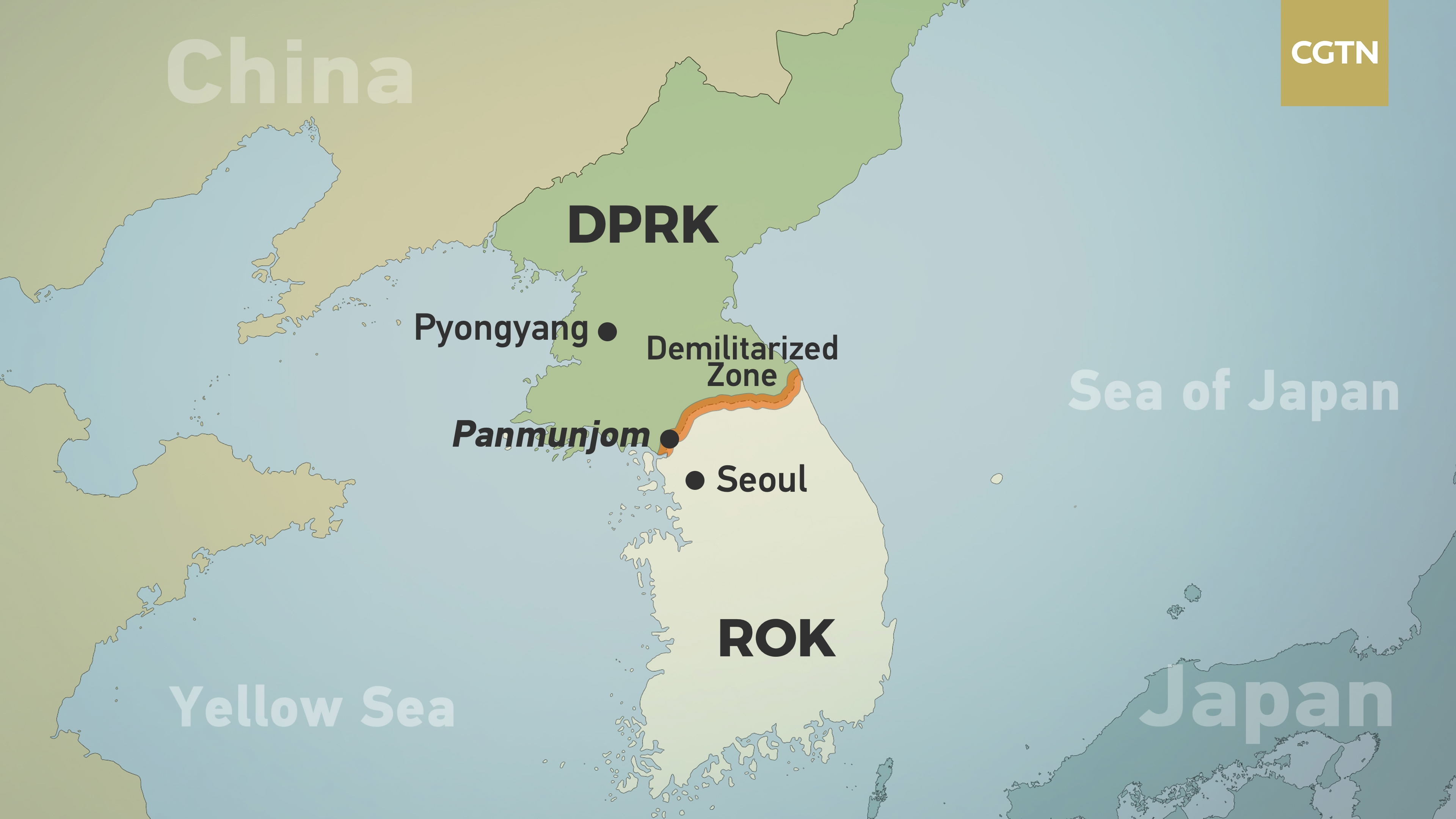
What's going on next?
After the historic meeting, the two sides are preparing for restarting the working-level nuclear talks as agreed by their leaders. The talks, according to Pompeo, are expected to occur in mid-July.
He said that the U.S. negotiation team will be led by U.S. special representative for the DPRK, Stephen Biegun, while for the DPRK side, the team will possibly be led by the former ambassador to Vietnam, said Yonhap, citing a diplomatic source.
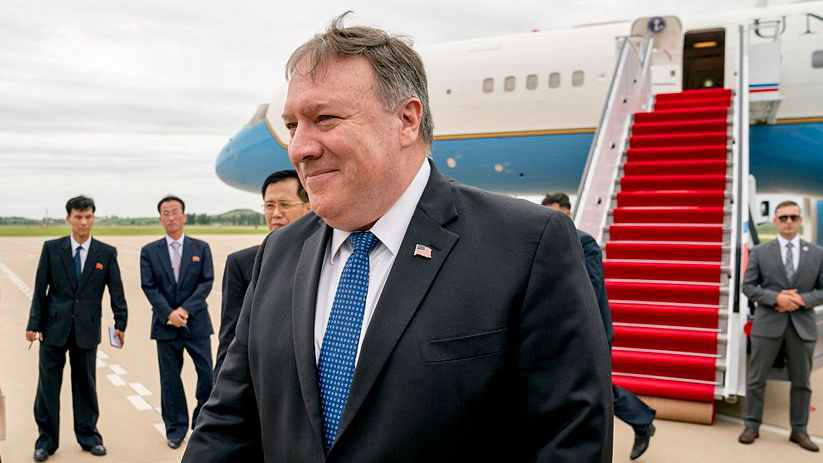
U.S. Secretary of State Mike Pompeo arrives at Sunan International Airport in Pyongyang, DPRK, July 6, 2018. /VCG Photo
All parties are closely watching the ongoing nuclear talks. A week after the summit, Chinese Vice Foreign Minister Luo Zhaohui reiterated China's support of contact and communication between the U.S. and the DPRK. During a phone conversation with Biegun, he expressed the hope that "the two countries can meet each other halfway and resume working-level consultations as soon as possible in accordance with the consensus reached by their leaders."
The U.S. side promised to improve communication and coordination with China regarding nuclear issues on the Korean peninsula, according to Biegun.
Among all concerned parties, the Republic of Korea (ROK) probably is the most excited party regarding the third Trump-Kim summit and the restart of U.S.-DPRK nuclear talks. It pays close attention to the preparation of talks with the hope that the breakthrough in U.S.-DPRK relations would possibly lead to a breakthrough in inter-Korean relations as well.
ROK experts also spoke highly of the historic meeting. Lim Eul-chul, a professor at the Institute for Far East Studies at Kyungnam University, told Yonhap that the summit "creates an important watershed moment in easing tensions on the Korean Peninsula" and "will help start a change in inter-Korean relations."
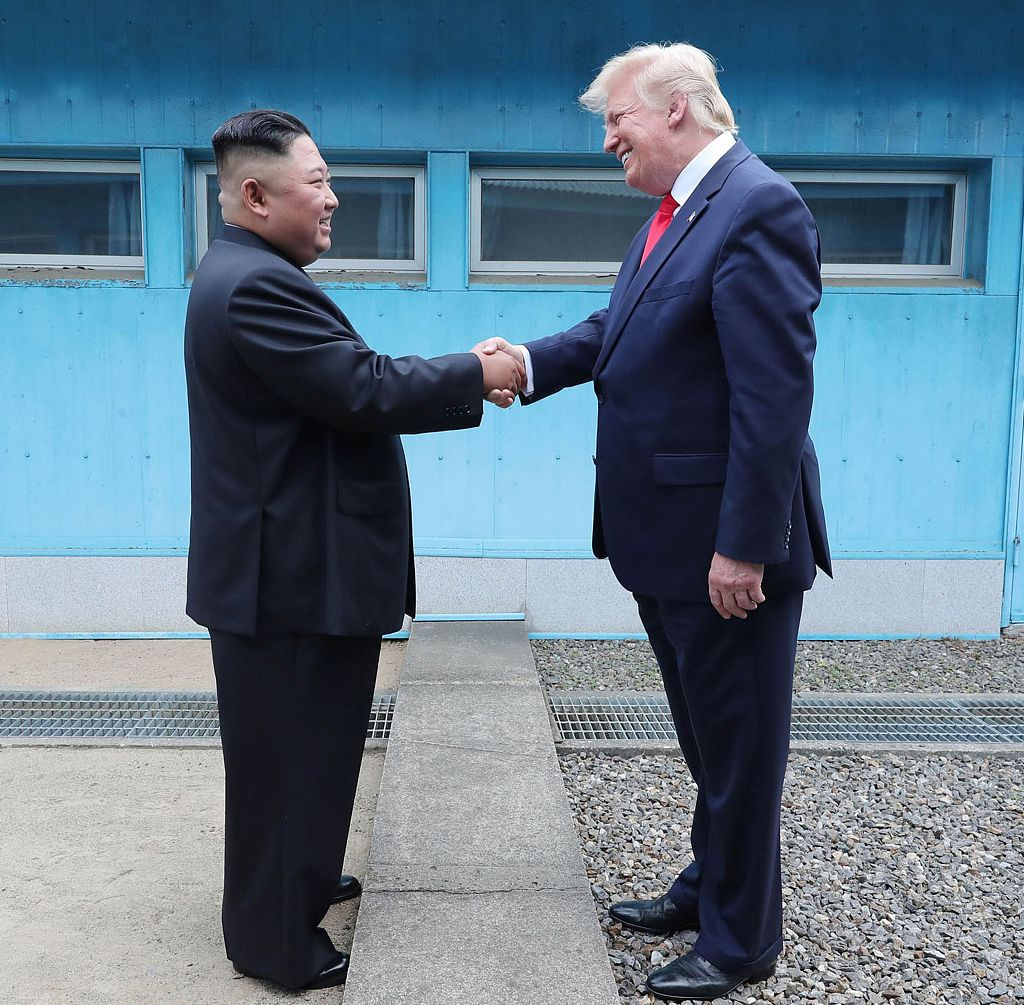
DPRK leader Kim Jong Un (L) shakes hands with U.S. President Donald Trump at the Military Demarcation Line in the Joint Security Area (JSA) of Panmunjom in the Demilitarized zone (DMZ), June 30, 2019. /VCG Photo
But regarding the possibility of making the breakthrough in nuclear talks, Lim remains cautious, saying that it would be hard for the two countries to "narrow their differences right away."
Lim is not the only one who holds that opinion, considering that after Trump and Kim's second meeting broke up without any agreement, many believe that progress would be limited as long as fundamental differences persist between the two sides.
What is the sticking point?
Back to the Singapore summit held over a year ago, according to the joint statement signed by the two leaders, both parties agreed on the need for complete denuclearization and a lasting peace regime built on the Korean Peninsula, but the sticking point remains over the process and definition of denuclearization.
The DPRK expects a "phased," simultaneous and "step-by-step" approach. It halted nuclear tests, dismantled some of its nuclear facilities and returned remains of U.S. soldiers and three American citizens arrested in the DPRK, waiting on the U.S. to take corresponding measures by lifting the economic sanctions imposed on the DPRK. The United States, however, prefers a complete and verifiable denuclearization before it lifts sanctions and grants security guarantees to the DPRK.
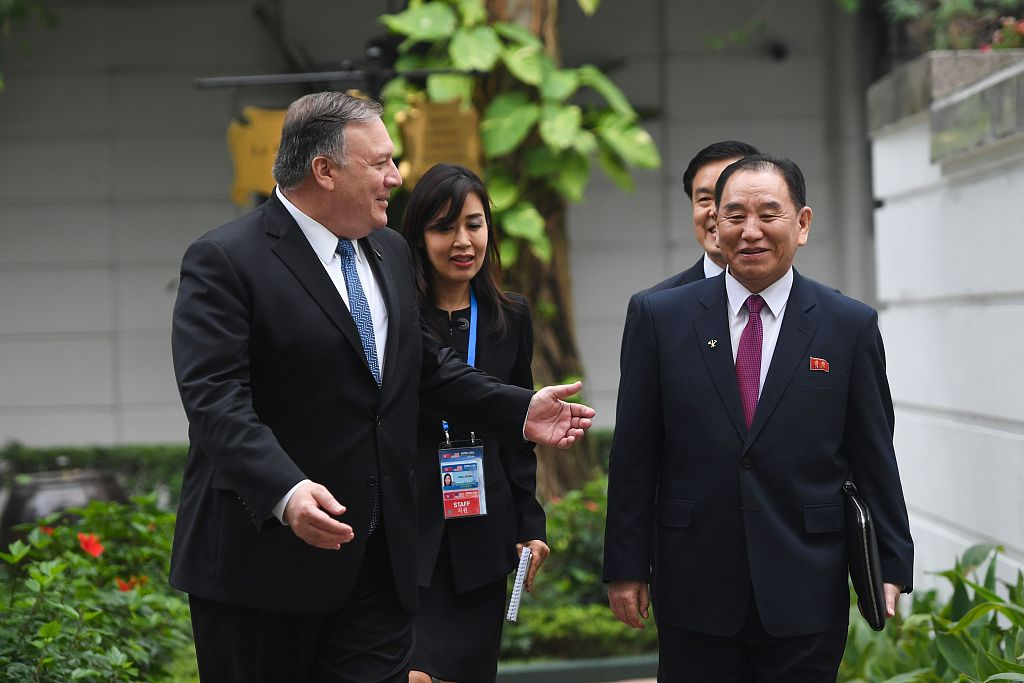
U.S. Secretary of State Mike Pompeo (L) speaks with DPRK senior ruling party official Kim Yong Chol during the second U.S.-DPRK summit at the Sofitel Legend Metropole Hotel in Hanoi, Vietnam, February 28, 2019. /VCG Photo
Teng Jianqun, an expert at the China Institute of International Studies, believes the purpose of Trump's visit to the DMZ was more about showcasing U.S. power in Asian geopolitics rather than the denuclearization of the Korean Peninsula.
His statement coincides with doubts on the effectiveness of further engagement between the two sides. If their view is correct, then the compromise from at least one side would be particularly significant in the negotiations. It also serves as the key to making a breakthrough.
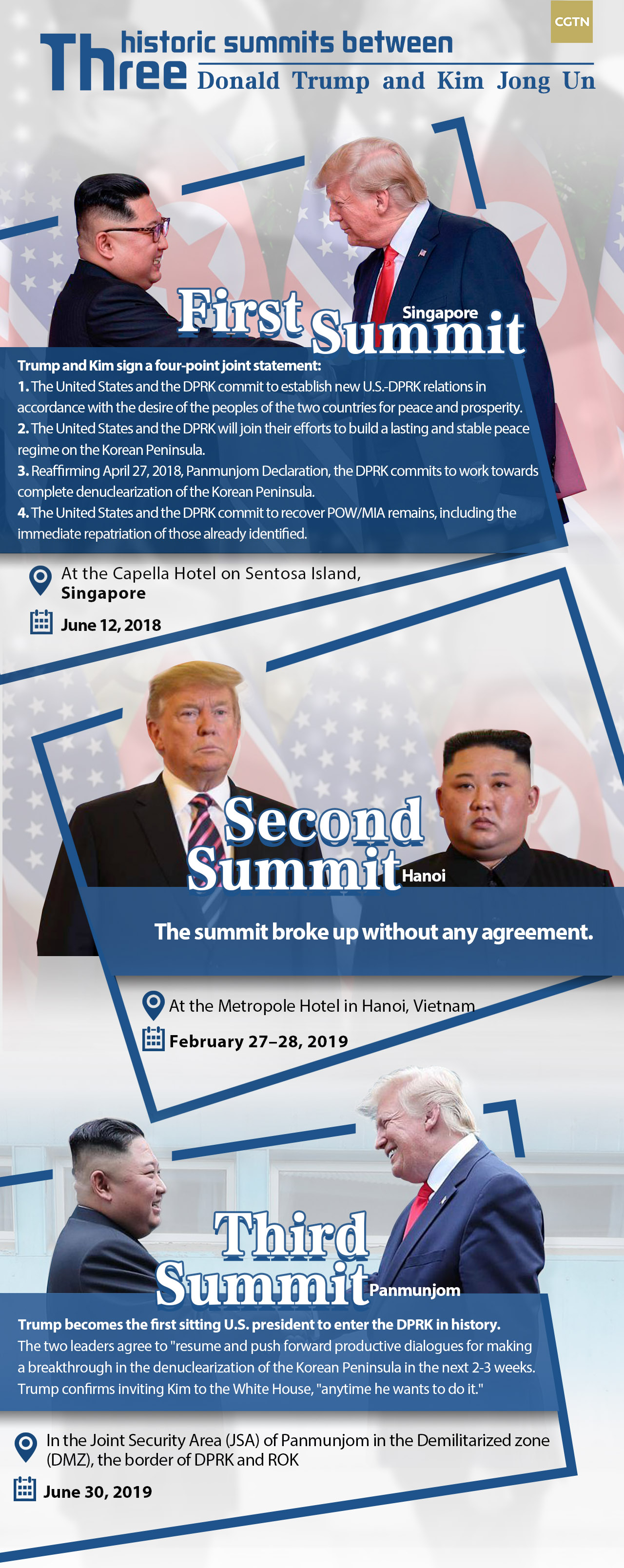
What has changed?
Despite Trump describing U.S. relations with the DPRK as "very nice," sanctions would "remain in place" though lifting them is possible as part of the talks.
When asked about the U.S. position on denuclearization in the resumed nuclear talks, Trump said that he was "not looking for speed [but] looking to get it right."
His elusive attitude makes it hard to judge whether the U.S. is ready to compromise. Diao Daming, an assistant professor at Renmin University of China, suggested that Trump's policymaking now is driven by the goal of re-election. He told the Global Times that Trump may take the meeting as a political show that attracts media's attention easily, "but making adjustments to the U.S. conditions on the DPRK, such as easing sanctions, is risky."
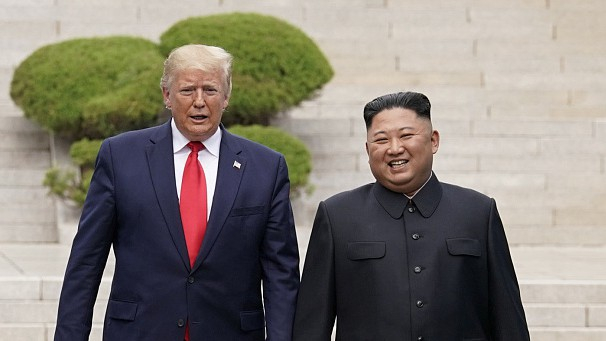
Trump (L) meets Kim at the DMZ in Panmunjom, June 30, 2019. /VCG Photo
"If public opinion in the U.S. shows that voters want to see more progress and would accept easing sanctions, Trump would probably show more sincerity," Diao said.
The DPRK side welcomed the meeting as well as the restart of nuclear talks. Kim said, he was "very surprised" by Trump's open invitation on Twitter, adding that his meeting with Trump has "created a precedent where we can meet at any time we want without being restrained to venue and format."
It seems that the meeting helped build a closer personal relation between Trump and Kim, but whether the personal bond would extend to better bilateral relations and progress on negotiations is uncertain.
(Cover: U.S. President Donald Trump (L) and DPRK leader Kim Jong Un talk before a meeting in the DMZ in Panmunjom, June 30, 2019. /VCG Photo)

Copyright © 2018 CGTN. Beijing ICP prepared NO.16065310-3
Copyright © 2018 CGTN. Beijing ICP prepared NO.16065310-3